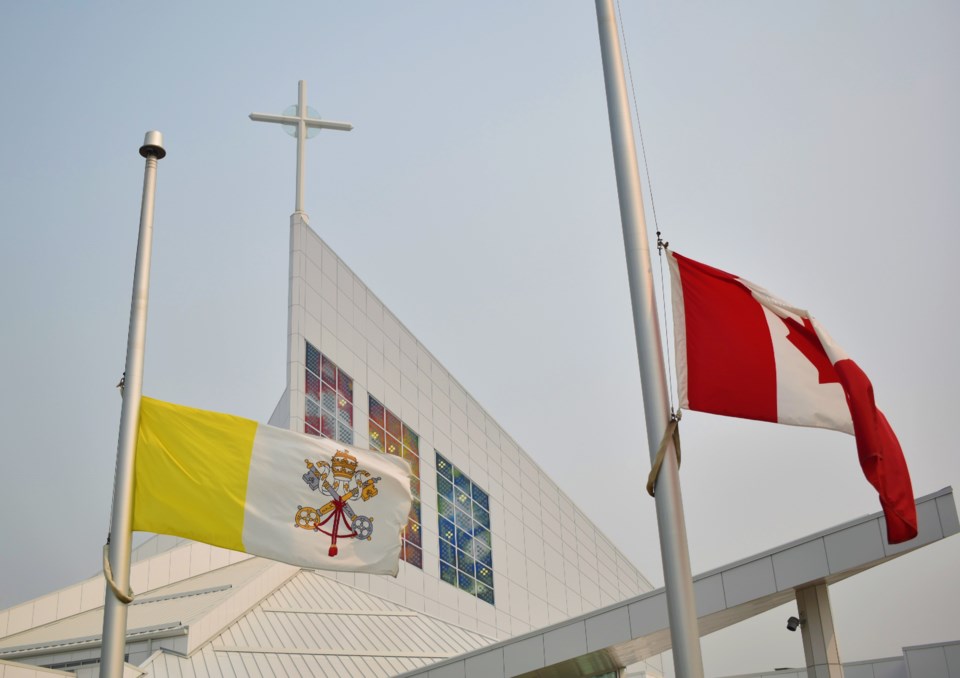SASKATOON — The Canadian Conference of Catholic Bishops is working on a framework for its national campaign to reach its goal of raising $30 million as part of its healing and reconciliation efforts to residential school survivors and their communities.
CCCB president Bishop Raymond Poisson, in a recent interview with Vatican News, said they are making progress in terms of addressing the Calls to Action included in the final report submitted by the Truth and Reconciliation in 2015.
The prelate of the Diocese of St. Jerome said the CCCB the issue on the abuses experienced by Indigenous peoples in residential schools were again highlighted after a series of discoveries were made of unmarked graves last year.
“For many months, we say, the most emotive moment of this crisis is in March [last year] when the discovery of this cemetery for children and also for people ... working in residential schools,” said Poisson.
“We [made] progress because last September, at the plenary of the bishops of Canada, we apologized for what's happened. All the bishops at this plenary were unanimously in this direction.”
He added they are also in the midst of fundraising.
“It’s $30 million that's to answer the Call to Action of the Truth and Reconciliation Commission from the government many years ago. To do something with projects of development, cultural development, and memorials.”
“To know better their culture, their existence, and doing something with them [Indigenous Peoples], not without them. It is always with them. So, I think it will be more significant because of these acts.”
CCCB vice president and Diocese of Calgary Bishop William McGrattan said, in a separate interview with The Catholic Register, they expect to share details of the fundraising campaign early this year.
The fundraising campaign was announced in September last year and the framework was expected to be completed by November. However, getting everything in place for a diocese-by-diocese effort turned out to be a huge undertaking.
“We’re doing this work and it’s just taken longer than expected. But I hope that it will be in the new year, in January or February, that these announcements of details would be able to be shared with the public and with Catholics,” McGrattan said.
CCCB officials are also making sure that they won’t make the same mistakes as during the 2008 to 2014 “Best Efforts” campaign that only managed to raise $3.7 million. CCCB is committed to raising $30 million in a five-year span.
All 73 dioceses of Canada will be responsible to fill in the difference if they fail to reach the goal. The bishops will then be held accountable for the money raised from the fundraising campaign.
McGrattan added it is important for them to do things the right way.
“We realize that it has taken longer than expected, but it’s important that we do this right and that we make sure that it is both transparent and that it demonstrates accountability. We’ve drawn upon the expertise of people in terms of governance, yes fundraising and also legal, because we do have to make sure that these funds are received by a non-profit and are directed to a non-profit organization or initiative. There are a lot of details.”
The campaign’s organizing committee — composed of bishops, finance officers and fundraising experts from the country — is focused on making sure everything is in line with the 94 Calls to Action compiled by the Truth and Reconciliation Commission.
Local committees of Indigenous leaders from dioceses or regions will be formed to consult with CCCB members on how to disburse the funds for Indigenous priorities, a process that Edmonton Archbishop Richard Smith said they had already started.
“We've started the process here in the Archdiocese (of Edmonton) to reach out to Indigenous leaders, to help us to discern the needs that are in the community. Might there be some programming that exists already in the community that can be supported by the dollars that are raised? This is going to be unfolding over the next little while, but I think the key thing for us to keep in mind is that these efforts will be Indigenous discerned and Indigenous led,” said Smith.
Mi’kmaq elder and former New Brunswick Lieutenant General Graydon Nicholas, in an earlier interview with The Catholic Register, said the entire Catholic church should take responsibility for the lasting legacy and effects of residential schools, and the failure of previous fundraising efforts.
“They said the Catholic involvement will raise money (in the 2006 Indian Residential School Settlement Agreement). One was to contribute toward the Aboriginal Healing Foundation and the second one was in fact to raise more money for other purposes. Of course, we know those targets weren't met,” said Nicholas.
“I didn't hear too many priests from the pulpit or many bishops (during the failed “Best Efforts” campaign) saying, ‘Hey, look this is something we're responsible for – this is something we have to do.’”
He added the healing and reconciliation campaign being done by the Catholic church leaders must go beyond monetary, like strengthening the relationships of non-Indigenous Catholic parishioners and Indigenous communities.




